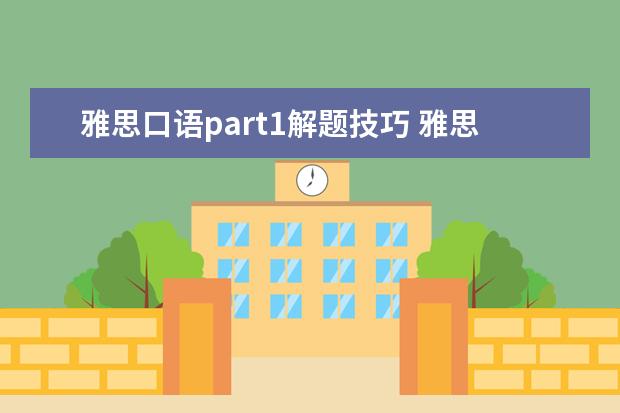雅思考试主要是通过对考生听、说、读、写四个方面英语能力的考核,综合测评考生的英语沟通运用能力,实现“沟通为本”的考试理念。对于雅思考生来说,也有很多考试难点和政策盲区需要帮助解答。今天雅思无忧网小编准备了雅思口语part1考试答题技巧 拒见光死 雅思口语part1答题技巧实例讲解,希望通过文章来解决雅思考生这方面的疑难问题,敬请关注。

雅思口语part1的回答技巧有哪些 ?
1.对于第一部分的雅思口语话题,问题比较浅,只要回答是什么,为什么,怎么样就可以。不需要回答的太多,也不要太程式化,以免让考官认为这是自己提前准备好背诵的,以后遇到话题深入时没有话,给自己挖坑。
2.第二部分的雅思口语话题会集中在卡片上。给一张卡片,上面明确指定要描述的内容和4条让提到的内容。拿到卡片可以准备30到60秒期间可以做笔记。之后进行2分钟的阐述。之后后考官会根据阐述内容选择性的问一个问题。不少考生都会准备一些话题,这是很好的备考方式,而且相对来说时间比较短。但缺点是,太多人用相同观点的话,不容易拿到高分。因此,准备话题时候要相应增加自己的观点进去,这才可以有的放矢。
3.第三部分的雅思口语考试话题是针对于卡片问些相关的问题,但会比第二部分更深入讨论。
拒见光死 雅思口语part1答题技巧实例讲解
拒见光死 雅思口语part1答题技巧实例讲解!在雅思口语考中,考官在什么地方就给你打定分数了呢?天真的烤鸭会说在part3答完之后,普通的烤鸭大约认为是在part2结束之后。其实啊真相只有一个,大部分的烤鸭,在它完成了雅思口语part1前3个问题之后,考官基本就给你确定分数了。是不是很可怕?一起来看看雅思口语part1答题技巧吧。 雅思口语part1开始部分的回答很重要,一方面,好的开头会给考官留下好的印象,你在考官心中的预期分数是往上走的趋势,另一方面,对自己来说,靠前面较为简单的题目建立信心,才有足够的心气完成后面的part2和part3。请看本位的雅思口语老师从渣渗自身教学实际出发分析的各种考见光死型的问题及3种提升技巧。 雅思口语考中,开始答题的阶段非常重要,直接关系到我们接下来的考状态,答得好可以令接下里来的发挥更加精彩,连连得分,答得不好则影响到整个答题的方向还有心态,当然容易丢分,所以说好口语考“句话”是需要技巧的。你的雅思口语part1回答丢分了么? 在咱们真正口语考的时候,往往你Part1每个问题回答的句话,就已经足以令考官给你口语的分数定个大致的范围了。你的句话让考官觉得是5分上下呢?还是6分上下呢? 雅思口语part1答题误区:不回答问题 貌似不可能的事情,但实际就真实发生在咱们很多同学身上。 如果我用中文问:在你附近有很多游泳的地方吗?那我们正常的回答是:有,没有或者不多。我们会先做出一个直接的回应,再做相应的解释。 但当把同样的问题变成咱们雅思口语Part1的题目时:Are there many places to swim near you? 我们同学的开头回答是这样的:There’s an ocean no far from our dorm. (节选同学的回答)或是Right in my school there is an outdoor swimming pool.(节选同学的回答) 抛开语法正确与否,我们同学开头句话会直接去回答更为详细的内容部分,而不做出任何直接的应题。这在考官听来就是完全的跑题。并且他会觉得你听不懂问题,而导致回答内容上出现很大的问题。 雅思口语part1答题误区二:题意理解错误,导致回答跑题 有一次咱们的每日练习题是:What kinds of apps do you often use? 这种问法是雅思口语P1P3的一类高频问法,什么种类。 但咱们同学90%以上的回答都是I often use Wechat, Youdao, Taobao… 考官心里打满问号,然后说:We use What’s app, google and amazon…… 哎,如棚脊这回答丢分真的好可惜。 请大看清,题目问的是什么种类?而不是你经常用哪个app?什么是种类?sche*ng app 时间安排类, information storage app 信息存储类, social networking app 社交软件类, games app 游戏类, lifestyle app 生活类等,这些都是种类,而不是具体的某一个app。 所以在题目的准确度上,咱们的句回答又一次出现了偏差。 雅思口语part1答题误区三:Yes or No 回答方式 还有一种常见的问题就是直接用Yes or No.去回答题目。这样的回答本身并无错误,但同样也没有太多出彩的地方。往往句回答是我们状态好,大脑负担少的状态,我们应和御该好好的利用这个机会,争取在答题开头部分多些加分项。 比如做到:paraphrasing, use less common words or idioms等,但一句简单的Yes or No, 是无法让考官给你加分的。并且这样的回答会伴随另一个问题的出现就是-重复原题。 当考官问:Would you say your hometown is a good place to live? 我们的回答是:Yes, my hometown is a good place to live. 对于计划6分的同学这样计划守的开头回答是可以的,至少不会出错,但要冲高的同学请看下文。 上述提到的问题,同学们应该自我检查并且避免,那我们应该如何提高呢? 雅思口语part1答题技巧一.学会使用filler 什么是Filler? Filler 可以理解为语气词,本身并无实际含义,但是可以起到口语表达中链接自己语句之间空白部分,或者可以作为开头的引入语,让整体表达听上去更Native,比如Well。 同样的,当考官问到:What kinds of apps do you often use?你的句可以这样回答:Well, apps for social networking are the most prevalent choice I use in my daily life. 确认回答的是“类别”而不是具体的某项app。二用well作为开头回答的个词,会让人感觉回答不那么突兀。让listener也就是考官有一个准备的意识,知道这个同学即将要开始答题了。 所有的语言都有类似这样的语气词,中文常说的是:嗯或额。这些词本身并无实际意义,但在正式回答之前说出来会让人觉得比较自然而不是像机器人siri那样去说话。 口语做到表达自然也是我们的目标之一,因为我们要避免机械化的发音,这也是我们评分标准当中的抛分项之一。 雅思口语part1答题技巧二、高端应题词汇的使用 对于Would you say your hometown is a good place to live?这样的问题,在不使用Yes or No的回答方式下,我们可以尝使用更为强烈的表达方式,如:Definitely, Absolutely, You bet. 这些都是表示Yes的更为高端的说法。 其实并不难,只是换了一个词而已,但这样的表达方式无论是在Jerry美的日常生活中,还是在我与美其他的外教IELTS Teachers 沟通的时候,我们都会建议考生能够用上类似的词汇以满足雅思口语的评分标准以便达到更高的分数。 有没有感觉原来雅思口语还可以这么简单,但怎么自己就没有想到?没关系有Jerry在,我会一项一项告诉你。 雅思口语part1答题技巧三、 确计划回答中有重点 在Jerry点评的同学中,90%以上都是语音语调非常的平淡,感觉大的生活毫无波澜,一种浑浑噩噩的感觉。这样不仅考官听着心情不悦,而且也满足不了雅思的评分要求。因为在评分标准中有强调要有语音语调。 比如:I’m not a big fan of water, so I don’t wanna have a boat. 我们可以强调的是I’m not a big fan of water, so I don’t wanna have a boat. 正如我之前所说,开头句话我们可以融入的加分项还是很多的,因为我们的大脑有相对多的准备时间。虽然能否长时间维持住这种状态,需要靠大量的练习来提高,但如果只是让开头句说的富有感情应该还是很容易做到的。 以上就是小编为大带来的《拒见光死 雅思口语part1答题技巧实例讲解》的全部内容。要想拳打雅思口语part1,脚踢雅思口语part23,请持续关注上海环球青藤。
雅思口语Part 3的答题技巧演示。
今天,环球青藤朱滚睁国伟老师和大家分享一篇关于雅思口语Part 3的答题技大毕岁巧演示文章,值得大家阅读学习。更多精彩好文章,尽在环球青藤!雅思口语Part 3问题1:What are some reasons why people eat out ?雅思口语数唤Part 3的答题技巧演示1:It’s a tradition that we intend to treat our friends and family on some special occasions , especially on birthday , and some important days . a fancy restaurant can provide us decent dining environment , delicious cuisines and thoughtful service . by the way , these days , office workers are getting busier , they have no time to prepare home cooked food , eating outside is the only remaining option .雅思口语Part 3问题2:Do you prefer to eat at a restaurant or eat at home ?雅思口语Part 3的答题技巧演示2:I prefer to eat at home . my mother is good at cooking , she usually prepares a table of delicious dishes at home . by the way , my country has a notorious reputation of food security . so eating at home is much safer.雅思口语Part 3问题3 What are the differences between eating at home and eating at restaurants ?雅思口语Part 3的答题技巧演示3: Eating at restaurants , you may enjoying a decent dining environment , cuisines with different taste and flavor , and thoughtful service . compared to eating at restaurant , dishes prepared at home are simple but balanced and nutritious .雅思口语Part 3问题4In my opinion what is healthy food ?雅思口语Part 3的答题技巧演示4: A healthy meal should be balanced and nutritious . in each meal , we need to intake various vegetables , different kinds of fruits and many types of proteins . by such way , we may maintain a good physical health .雅思口语Part 3问题5What are some examples of unhealthy food ?雅思口语Part 3的答题技巧演示5:In my opinion , there are many types of unhealthy food , like western style fast food , desserts with high calories , and food sold at street vendors . food like French fries , hamburgers are very harmful to our health .以上即是本次环球青藤口语老师朱国伟的关于雅思口语Part 3的答题技巧演示文章分享。逻辑能力强,精通口语词汇。对于欧美的文化很了解。多年的教学经验帮助了不少雅思考生顺利进入理想学府,桃李满园。相信他的这篇文章必定能给与烤鸭们不少帮助和启发。如果对于我们雅思课程想了解更多的话,欢迎与环球青藤课程顾问做进一步的咨询与了解,这里有不同的单项课程以及全项课程,适合不同要求的你!后,环球托福预祝各位雅思考试取得!早日圆满出国留学梦!
雅思口语part1回答过长会怎么样?
先回答问题:雅思口语part1回答过长并不意味着高分,来看个大华考生笔记
在Part1中,考官的问题通常比较简短,结果导致考生滔滔不绝、过度发挥,反而造成了打乱节奏的感觉。
我第一次参加雅思口试时,被问到:Do you like movies?,放在平时回答这种一般疑问句,我肯定是一句话“Yes,I do”回复。
但我因为紧张不仅回答了“是与否”的问题,还把喜欢什么电影,平时多久看一次之类的内容都说了,其实这是考官下一步要询问的。事后想想,可能是这种过长的回答让考官觉得很不自然,所以后来的分数才不是很高。
雅思口语Part 1是口语考试的引入部分,目的在于让你的口腔肌肉充分warm up。在这个阶段,会被问到的题目都是与自身有关的日常生活类话题,考官不期望你对任何话题展现出字典级别的知识水平,而常会被问到问题类型也多是常见的这几种:
2.讲述故事,可以是个人经历,有趣的事等, 比如:
Q:when did you watch your first movie in a cinema?
你还记得第一次去电影院看电影是什么时候吗?
A: I can’t really remember,it was so long ago. But I do remember very clearly going to see the Saw. It was my first time watching a horror movie. And I was so scared that my mum had to take me out of the movie.
这是很久之前的事,我实在记不清了。但在电影院看《电锯惊魂》的经历让我印象深刻,那是我第一次看恐怖片,因为非常害怕,我妈妈不得不带我离开。
3. 针对问题表达个人观点, 比如:
Q: do you like shopping for clothes?
你喜欢逛街*衣服吗?
A: oh yes, I LOVE it! It’s my favorite free activity which makes me really happy especially when I finally get what I want after long expectation. Sometimes, I think I spend far too much money, though, and I ‘d spend more if I had it.
是的!我非常喜欢!这是我最爱的休闲活动,我很享受它带给我的快乐,尤其是在*到一件心仪已久的衣服之后。虽然我知道自己已经花了很多钱,但如果有更多我仍然会继续*衣服。
雅思考官教你雅思口语PART1考试技巧
上海环球青藤为大家带来一份由雅思考官写的雅思口语part1考试技巧,各位考生可以根据雅思口语考官的建议来准备雅思口手陵链语考试。希望对毕孙大家雅思口汪或语备考有所帮助。IELTS is set into three sections.
Part 1 is generally something about you, where you are from, do you like something, what do you think of something etc.
So you can prepare before the test to answer some of these questions. Of course you can't prepare for all things, as the examiner may throw in a few curve balls (tricky). This exchange of questions is going to be about 5 minutes.
When asked a question, for example, “Where is your hometown?” you might answer“Shanghai” This is correct but hardly a worthy answer that will convince the examiner to expect a lot from you.
Give the place and then say something about it as this shows you can engage in a conversation and not just regurgitate (give) facts and names. Maybe say something about the city, location, size, the fact you might not know much about it because you left at a young age.
“I come from China's largest city Shanghai, on the coast; do you know the area of Minhang in Shanghai? That is the part of Shanghai I was born”
A bit more than just one word.
Chances are you will get a follow up question as this is a conversation and in conversations you garner (get) information from those you are talking too.
“Can you describe… to me” or “How has the city changed” or “What do you like/don't like… about…” or “What are the people like” or "Who lives in your neighbourhood" or"Where do you buy groceries"
Answer how you feel. This isn't a test on facts, if you lie all the way through then be prepared as lying or non-truths can come back to haunt you.
“I come from the state of Nanjing in Beijing, next to India” Completely wrong but no one is taking notes on that. You will get a follow up question about it so chances are you will have todig yourself out of that hole (talk your way out of a lie). The truth is often easier to talk about.
There is a good chance you will also be asked about school or work as that is one of the main questions asked to someone you don't know.
If you are in school then maybe something about enjoying school or not enjoying school or maybe something about a topic in school, why do you study that?
If you are working then questions about what your job might be, how long have you been there, do you like it, will you stay long?
Again you don't have to tell the truth, maybe just half truths in case you feel you shouldn't give out too much information.
“I am an International spy here to assassinate you”
If you feel uncomfortable about a question then, just as in a conversation, say so and give the reason in a polite way. Politeness goes a long way. The examiner will understand as they are nice people and will try to reword the question so it isn't so invasive (direct) but they will also be able to tell if you are saying that just to bypass a question you find difficult or just don't like.
Other questions are likely to be about basic everyday things. Something about your family, neighbours, workmates, perhaps the weather or something to do with food or shopping. These are everyday things, or what you might ask someone you just met. Every question will likely have a follow up related to them. They are direct questions about the topic.
So food questions may deal with local dishes or if you like sweet food or who should do the cooking and why?
Something about your family might be the size of the family, what someone in the family does, your role in the family etc.
Be clear and precise, don't go off topic too much and don't repeat, don't repeat what you want to say. Be yourself, take a deep breath before you speak and if you spend a second thinking about it before you start talking, then nod in acknowledgement to the question. A little dead air for a second or two is fine as that is natural in conversations. A second or two, not five or 10 seconds.
Here are some other topics to think about. You can probably answer questions on them in your native tongue so now practice using English only.
Family, Language, your routine, holidays and festivals, travel, sport, Foreigners in China, Entertainment like TV and reading, cultural areas like art and architecture.
There is something called the 5Ws of Who What Where When Why and How. Basic words used to gather information. Maybe 'Have' and 'Will' should be in there too.
Pick a topic and try making questions using the Ws along with how, have and will. This isn't how questions are chosen but it is good way to practice and to help you anticipate the next question.
Like Sun Tzu says, "If you know your enemies and know yourself, you will not be imperilled in a hundred battles... if you do not know your enemies nor yourself, you will be imperilled in every single battle." The questions are the battle not the examiner.
以上就是雅思无忧网为您准备的雅思口语part1考试答题技巧 拒见光死 雅思口语part1答题技巧实例讲解全部内容。访问雅思无忧网(https://www.yasi.cn/),了解更多雅思考试新消息,新动态。
雅思培训
免责声明:文章内容来自网络,如有侵权请及时联系删除。


 雅思part1口语真题 雅思口语Part1如何进行?如何应对?
雅思part1口语真题 雅思口语Part1如何进行?如何应对?
 雅思口语part1模板技巧 雅思考官教你雅思口语PART1考试技巧
雅思口语part1模板技巧 雅思考官教你雅思口语PART1考试技巧
 雅思口语part1解题技巧 雅思口语Part1&2&3复习技巧分别详细讲解?
雅思口语part1解题技巧 雅思口语Part1&2&3复习技巧分别详细讲解?
 英雅思口语part1题库 雅思考官教你雅思口语PART1考试技巧
英雅思口语part1题库 雅思考官教你雅思口语PART1考试技巧
 雅思口语part1题库大全 雅思口语Part1&2&3复习技巧分别详细讲解?
雅思口语part1题库大全 雅思口语Part1&2&3复习技巧分别详细讲解?
 雅思口语话题part1题库听力 ★雅思口语Part1问题互通的话题有哪些
雅思口语话题part1题库听力 ★雅思口语Part1问题互通的话题有哪些
 雅思口语part1题库修理东西 雅思考官教你雅思口语PART1考试技巧
雅思口语part1题库修理东西 雅思考官教你雅思口语PART1考试技巧
 雅思口语part1只从题库抽吗 雅思考官教你雅思口语PART1考试技巧
雅思口语part1只从题库抽吗 雅思考官教你雅思口语PART1考试技巧
 雅思口语考试part1题库会变化嘛 在雅思口语,考官会根据PART1你所说的给你part2的top...
雅思口语考试part1题库会变化嘛 在雅思口语,考官会根据PART1你所说的给你part2的top...
 雅思口语part1题库2019年5月 雅思口语机经:2011年4月16日Part1
雅思口语part1题库2019年5月 雅思口语机经:2011年4月16日Part1